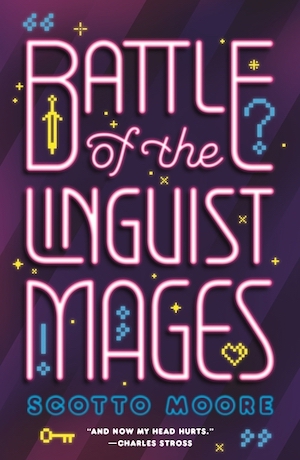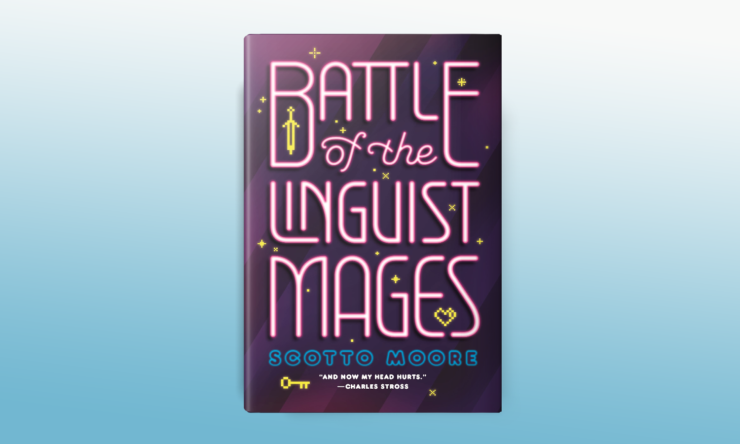When a friend told me he’d seen a publication announcement for a book called Battle of the Linguist Mages, I was of two minds on the whole concept. The only way it could work, thought I, was as a comedy, and that’s what the promotional material indicated. Either way, I knew I had to read it. It’s out now, and I’ve read it. (I received a NetGalley review copy.) Let’s discuss!
Isobel is a gamer. Not just any old gamer; she’s the Queen of Sparkle Dungeon, the VR MMORPG where you can cast spells with your voice using shortcut sounds, or the regular way on your keyboard. When she gets an invitation to playtest the spellcasting system of Sparkle Dungeon V, she accepts it, obviously. But it’s a weird playtest, which takes place at the marketing company that owns the license of Sparkle Dungeon. The marketing chief tests out different sounds on Isobel and asks her to use the spell shortcuts she’s heard to create a spell that she would use in the game. Then she blows out the windows in the test chamber.
The marketing firm has been playing a long game: using the voice spellcasting system to teach players how to use “power morphemes,” which, they explain, are morphemes that contain more information than they should because they’re condensed. And, as it turns out, they work like magic spells in the real world. This is possible because space aliens colonized humanity several thousand years ago…in the form of punctuation marks. The aliens were running away from a civilization-devouring storm (reminiscent of The Nothing from The Neverending Story) and now they want humanity to defeat it.
The book posits a dimension of reality (or irreality, really, because the marketing guy compares it to imaginary numbers) called the logosphere, where all ideas that have ever existed come to die when nobody remembers them anymore. It’s in the logosphere where the showdown with the storm will occur, as it attempts to devour the universe. I like the idea of a logosphere. It’s not unique to this story, of course; many people have written about multiverses where all the tales are true, but which ones are seen as real are depends on where the observer is.
Buy the Book


Battle of the Linguist Mages
The book provides a good explanation of basic morphology, phonemes, and morphemes, which I thought was a nice touch. It also points out that there is a difference between spoken and written language, which is absolutely true. This distinction is made in the service of explaining how they know when the punctuation marks colonized humanity’s minds, but, you know, whatever! It’s gamer humor SF, not a linguistics textbook.
Where a phoneme is a basic unit of sound, a morpheme is a basic unit of meaning. Morphemes are composed of one or more phoneme. A morpheme can be a single syllable or polysyllabic. For example, car is a morpheme and so is yellow, and so also is the suffix -ed that creates a past tense. Morphemes can be sandwiched together to create new words, like auto and mobile to make automobile, or a thing that moves on its own power. You can stick -er onto the end of a word, usually a verb, and get a person who does the verb, like baker or driver. Morphemes aren’t always transparent, and people reanalyze them into forms that make more sense. That’s why we split helicopter [helico + ptera] into [heli + copter]; English words don’t start with pt (loan words like pterodactyl aside), so we reanalyze the split to match English phonotactics. The humble hamburger was also subject to this type of reanalysis, [Hamburg (city) + er] to [ham + burger], even though a burger has nothing to do with ham.
The posited “power morphemes” in the novel contain more information than just denotational meaning. They also include emotion and a whole mess of other things, which is what gives them their power, which is the ability to affect reality in a way that looks a lot like magic. Is such a thing plausible in reality? Almost certainly not, but it’s fun to imagine.
As far as Battle of the Linguist Mages itself goes, I enjoyed it a lot. I’m not an MMO gamer myself, but I know enough people who are that I can understand the references and jokes. If you are a gamer, I’m sure you’d catch even more of them. There’s politics, romance, a church that is definitely not Scientology…it’s got everything.
Have you read this book? Do you want to? What are your thoughts on the logosphere and the way the story incorporated linguistic concepts? Chat in the comments!
CD Covington has masters degrees in German and Linguistics, likes science fiction and roller derby, and misses having a cat. She is a graduate of Viable Paradise 17 and has published short stories in anthologies, most recently the story “Debridement” in Survivor, edited by Mary Anne Mohanraj and J.J. Pionke. You can find her current project, a book on practical linguistics for writers, on Patreon.










